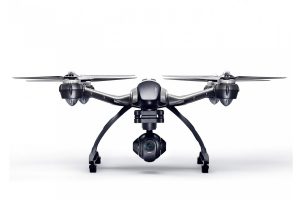Domicile Consulting’s New Toy, the Yuneec Q500+
Our company recently purchased a quadcopter UAV (unmanned aerial vehicle), a really cool drone with a killer, gimbal mounted, high-res multifunction camera. Its intended use is to provide us a means of inspecting inaccessible roofs for leaks and other problems. Unfortunately, as I write, our Yuneec Q500+ drone is sitting on a workbench at Yuneec’s repair facility out California way while, back in Chicago, its operator (me) awaits a damage assessment/repair bill. It’s FUBAR. I know. I scraped it off the ground.
I am not alone. As of January ’16, almost 300,000 recreational drones have registered with the FAA. Expect this number to go sky high come summer, as the FAA should make Part 107 the new law on the block. Currently, an operator of a drone for profit is required by law to possess a pilot’s license… a real, bonafide pilot’s license. However, I recently attended a Meetup panel presentation titled “Is the Sky the Limit?” where Mark Foisy, the Aviation Safety Inspector/Unmanned Aircraft Specialist for the Federal Aviation Agency, hinted that Part 107 will likely do away with this.
The exploding population of drone pilots
As said, this will likely cause the number of drones and drone operators to skyrocket. To say the drone industry is a magnet to dreamers, schemers and snake oil salespeople is an understatement. With the tech built into today’s consumer UAVs, practically anyone who’s ever picked up a game controller can fly a drone. It’s a no-brainer. Hell, I flew ours mere hours after acquiring it. And I take RTFM very seriously. So it is absolutely imperative that  operators are held to high standards of safety, responsibility and oversight.
operators are held to high standards of safety, responsibility and oversight.
Think about this. The operator of a 15 pound drone has a flyaway (a loss of operator control). The UAV crashes, resulting in vehicle accidents, property damage, personal injury or other mayhem. And with their proliferation and likely ubiquity, the potential for such scenarios increase.
So what is a fledgling drone operator to do? Moreover, what will the regulatory outcome be? Regarding the latter, the FAA has the final say, and they’re still trying to figure it out. The rules will invariably be tweaked, again.
As for me, my plan is to operate responsibly, within the current regulations. In anticipation of Part 107, I’m planning on taking flight school (ground school) courses to become familiarized with the the terminology and NAS rules and regs. Ignorance has no place in the wild, wild NAS.

John Eiberger
Ken Whitelaw
Dan Cullen
Commercial valuations hawkes bay
Dan Cullen
Caden Dahl